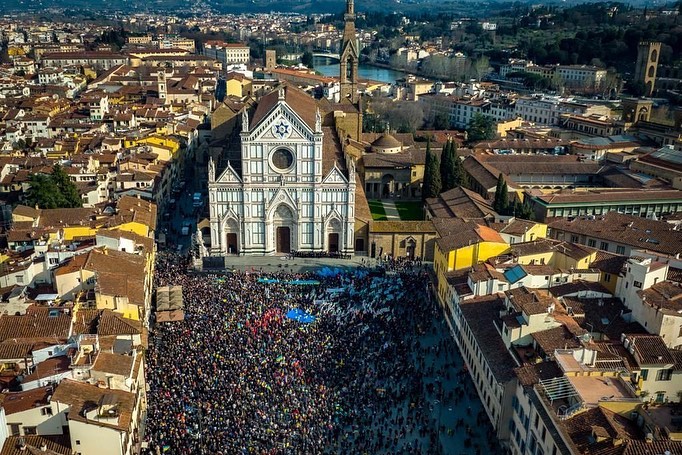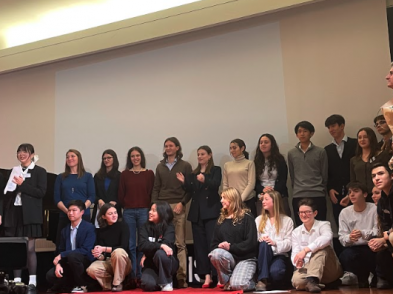The situation in Ukraine and Russia has been progressing for years now. Even before Russia invaded, it had been hanging like a dark shadow. With remarkable effort, Ukraine has been repelling Putin’s attacks. However, the Russian President made it clear that he won’t be giving up any time in the near future, which means that Russia and the world are forced to consider the long-lasting effects that the conflict will have on those directly affected, here in Italy as well as the global ramifications it could have.

When the conflict first appeared in the headlines, most nations took stock before taking any direct action as they were afraid of ruining their relationship with powerful Russia or starting a world war. Despite the first considerable consciousness, Russia’s aggressive actions have drawn extreme attention to the conflict, urging other nations to respond accordingly.
Throughout recent weeks, the EU, US, UK and other countries have increasingly imposed sanctions on Russia. The latest sanctions even included the long discussed banishing of Russian banks from SWIFT, a high-security network that connects 11,000 financial institutions in 200 countries to facilitate payments.
Russia, with its far-reaching influence and strong economic connections all over the world, has placed its allies in a tricky situation with the invasion of Ukraine. Specifically, European countries such as Italy, which is known to have the strongest European relationship with Russia, have been in the hot seat since the escalation of the conflict. Over decades, Russia and Italy’s economic ties have tightened progressively. Italy is not only economically connected, but also relies on natural gas for up to 40% of its energy resource. Therefore, Italy has to balance the fine line between boycotting Russia and standing up for peace.
However, Italy is not alone, as the country—together with the rest of Europe—relies heavily on Russian gas supplies. Overall, up to 40% of European natural gas lines supplies are delivered by Russia.
Looking at the current situation, the EU is aware of the threat that their dependence on Russia poses. Searching for new energy supplies to fill the void Russia could leave will not be an easy task. The price hikes have been especially difficult for Italy, which is more reliant on natural gas for energy than most of its European neighbours and produces very little of its own. The lack of nuclear capacity and domestic gas production will make it difficult for Italy to sustain long-term energy security if Russia were to cut off all energy supplies. Nevertheless, countries like Italy are searching for different energy supply options to cover the gap Russia is leaving. For one, that means looking at more local and sustainable energy sources. Though Italy’s long-term goal is to increase domestic energy output from sustainable sources, this is still a long way off, and the Italian Prime Minister Mario Draghi highlighted that gas “remains crucial as a transition fuel” for the time being.
Italy has a long history with Russia in addition to strong economic bonds tying the two nations, although Russia’s influence seems to be slowly diminishing. As a country, Italy is obviously more closely aligned with the EU as seen in the country’s response to the Russian invasion. Although Italy has more at stake than most countries, it has nevertheless been supporting sanctions against Russia and, through the statements of Prime Minister Draghi, it is clear that Italy will unite with its western allies and stand against Russian power.
There is no doubt that the global economy will suffer a blow in the future. The crisis is already hastening the EU’s immigration integration process to welcome Ukrainian refugees. We are already feeling the effects, such as increasing gas prices all over the world. It is stifling growth and placing upward pressure on inflation at a time when it is already high.
Nevertheless, all these countries stand together to support Ukraine against its invader. Even Switzerland, which has a long history of neutrality, has agreed to the EU’s sanctions against Russia.
It is important not to forget that, even though financial punishments are often dismissed as solely symbols of support, in this case it could hurt to the extent that it might be a cause of recession. If Russia’s natural gas supply were to be halted, the Russian economy would take a huge hit, erasing up to 3% of the country’s GDP. The current sanctions are already burning holes in Russia’s economy. Moscow’s stock market exchange closed and Russian oil trades have hit an ever deeper discount to Brent.
We are looking at hard times ahead in terms of energy and gas prices as this conflict continues. The conflict is hurting economically and is simultaneously forcing countries to move towards sustainable energy.
Louise Gutbrod is a student at The International School of Florence.








